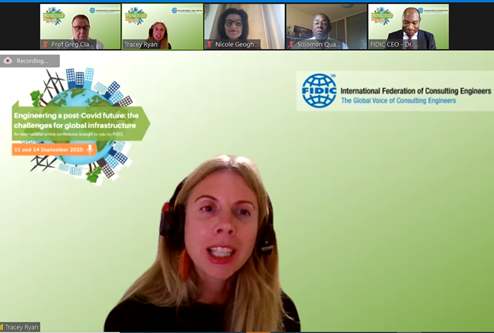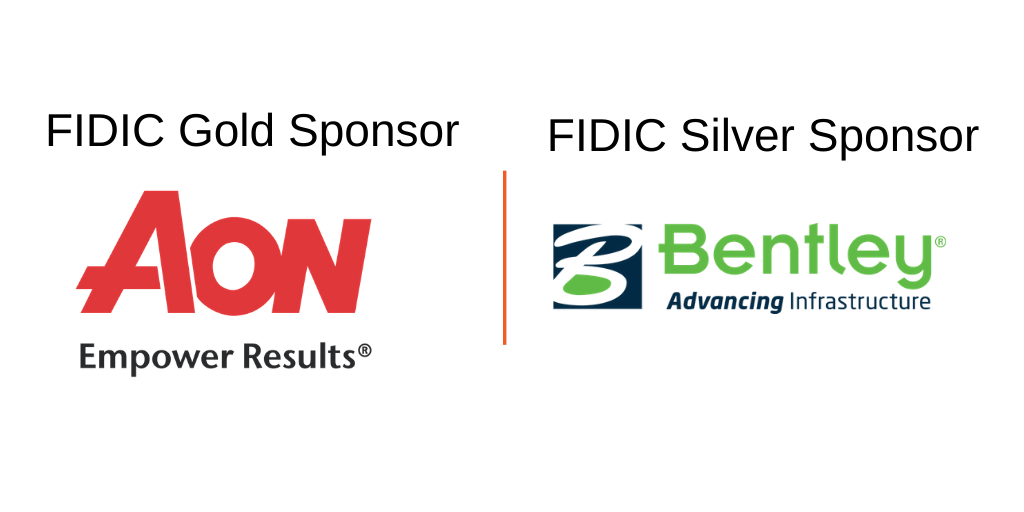The first-ever online FIDIC international infrastructure conference kicked off today (11.9.20) with panellists and delegates taking part in the “Engineering a post-Covid Future – the challenges for global infrastructure” event from all over the world, writes FIDIC communications advisor Andy Walker.
Over the two-day event, the conference, sponsored by Aon and Bentley Systems, will address many of the issues currently occupying the global infrastructure sector as it grapples with the challenges of a post-Covid future. Day one of the online conference looked at infrastructure after Covid and what that will look like, shining a light on global infrastructure perspectives and the likely developments as the world emerges from the pandemic.
Introducing the first conference session, Greg Clark, global head of future cities and new industries at HSBC, said that Covid-19 would have a profound effect on cities and how people live in them. Pointing out that the world is now living in “a century of the city”, Clarke also reminded delegates that the globe was also grappling with the consequences of climate change which was presenting infrastructure with an additional challenge. The Covid crisis had also seen the acceleration of business model changes as firms grapple with the new digital realities, he said.
“The science about the virus is still uncertain and a vaccine is still far off and there is unlikely to be a ‘silver bullet’ to see it off,” said Clarke. He also said that there would be fiscal stresses as governments tried to come to terms with financial challenges and the approach would be different across nations. The transport sector would face particular challenges, Clarke said, and there would also be a big agenda around the accessibility of infrastructure, including digital and health facilities. “Tele-medicine will increase in the future as a result of the pandemic,” he said.
“If I were part of the global infrastructure sector I would be watching very carefully how governments and societies respond to this crisis and consider carefully the effects on business models and how the sector will have to operate in the future,” Clarke said.
This point was amplified in the panel discussion. Solomon Quaynor, vice president, private sector, infrastructure and industrialisation at the African Development Bank Group, said that people are likely to want to live differently in future and therefore infrastructures will need to be much more flexible in order to be used for different things. This “hybridity” is likely to be a key trend going forward and would give rise to new financial models in how infrastructure is funded.
Nicole Geoghegan, general counsel at (HS2) Ltd said that they were looking at how they can partner with the private sector in order to shape the infrastructure they were building, especially in the area of digital connectivity. Tracey Ryan, managing director of Aurecon New Zealand, (pictured above) said that the industry could definitely do more and take a wider view of what was possible and what was needed in a post-Covid landscape.
“We are going into a period of extreme innovation and experimentation,” said Greg Clarke and a period where there will not be a single or clear answer to the challenges that will be presented as a result of Covid. Clarke said that it was very likely that the commercial sector would be called on more to finance infrastructure in new and different ways as governments would have to make do with less fiscal room for manoeuvre. This was “the time of the engineer” said Solomon Quaynor and there were big opportunities for the sector in raising its profile and making a real difference.
Concluding the introductory session of the conference, Greg Clarke said that there was a common interest in the finance sector and the engineering and construction sector understanding how infrastructure is financed and, flowing from that, how risk is managed. “This is a shared agenda for years to come and the whole industry needs to work together to build a more collaborative approach to find solutions,” said Clarke.
FIDIC is grateful to Gold Sponsor Aon and Silver Sponsor Bentley Systems for their support of this event.








